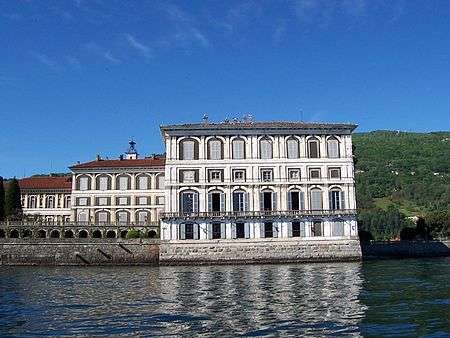Stresa Front
The Stresa Front was an agreement made in Stresa, a town on the banks of Lake Maggiore in Italy, between French Prime Minister Pierre-Étienne Flandin (with Pierre Laval), British Prime Minister Ramsay MacDonald and Italian Prime Minister Benito Mussolini on April 14, 1935. Formally called the Final Declaration of the Stresa Conference, its aim was to reaffirm the Locarno Treaties and to declare that the independence of Austria "would continue to inspire their common policy". The signatories also agreed to resist any future attempt by Germany to change the Treaty of Versailles.

Patrick Buchanan's Churchill, Hitler and the Unnecessary War considered the Stresa Front the last chance to stop Hitler before the Second World War.[1]
The Stresa Front began to collapse after the United Kingdom signed the Anglo-German Naval Agreement in June 1935 in which Germany was given permission to increase the size of its navy. It broke down completely within two to three months of the initial agreement, just after the Italian invasion of Abyssinia.[2]
Background
Hitler reintroduced military conscription in Germany and announced the creation of the Luftwaffe (the German air force), both in violation of the Treaty of Versailles. In response, the former wartime allies and guarantors of the peace treaty, Britain, France, and Italy, met at Stresa, Italy, in April and there discussed collective action to uphold the disarmament terms of the treaty; this understanding became known as the "Stresa Front". Its maintenance, specifically the challenge of keeping Italy a foe of Germany, formed the motivation for Britain's foreign policy for the next 18 months; in effect it was the beginnings of "appeasement". In August 1935 Italy attacked the empire of Ethiopia in Africa, announcing that it had apprised Britain and France at Stresa of its intentions of doing so. B.E.[3]
The Stresa Front was triggered by Germany's declaration of its intention of building up an air force, increasing the size of its army to 36 divisions (500,000 men) and introducing conscription in March 1935. All of those actions were direct violations of the Treaty of Versailles, which limited the size of the German army to 100,000 men and prohibited Germany from using conscription and having an air force.
However, British politicians did not want to attack or occupy Germany but preferred to have agreements with it to maintain peace in Central Europe. Also, antiwar sentiment was very strong among the British public. In February 1935, a summit in London between French Prime Minister Pierre Laval and British Prime Minister Ramsay MacDonald led to an Anglo-French communiqué issued in London that proposed talks with the Germans on arms limitation, an air part and security pacts for Eastern Europe and the nations along the Danube.[4]
Mussolini thought that the signing of the Stresa Front would mean that the United Kingdom and France would not interfere in the Abyssinian crisis.
Conference

Even though the increasingly-belligerent Germany dominated discussions within the conference room, Mussolini was most clever outside it. With Britain, he discussed plans to pursue his aim of making Italy 'great, respected and feared' by the invasion and conquest of Abyssinia and the creation of an all-powerful empire. Mussolini made sure not to discuss his expansionist plans within the confines of the conference itself, as he knew of the risk of the Western democracies issuing a veto over it. Furthermore, Mussolini could not risk the conference being sidetracked from its main aims, reaffirming Locarno and opposing any more breaches of international agreements.
Mussolini got his way, and his plans to invade Abyssinia were not brought up. He took that silence as acquiescence to his colonial war and launched his invasion of Abyssinia in October 1935. That was the turning point for Mussolini, as he drifted away from Britain and France and toward Germany.
Dissolution
Soon after Stresa, on June 18th 1935,... Great Britain signed a naval agreement with them and without informing neither France nor Italy, which put a direct proportion to Germany and Britain by number and tonnage of warships, in fact renegading the agreements of Stresa, as well as those of Versailles of 1919. Benito Mussolini was furious when he heard the news and, unfortunately for Italy, convinced himself that Hitler couldn't be stopped anymore and that, therefore, he had to ride the tiger. – John Simon[5]
The front collapsed completely with the Italian invasion of Abyssinia.
Mussolini had long held ambitions of controlling Abyssinia and was enraged by the signing of the Anglo-German Naval Agreement without being informed.[6] Mussolini had held back on his invasion plans to avoid alienating his allies, especially since Ethiopia bordered French Somaliland and British Somaliland. However, he felt betrayed by Britain and so decided that there was no reason against the invasion. He also believed that the agreement violated the Stresa Front.
On January 6, 1936, Mussolini told German Ambassador Ulrich von Hassell that he would not object to Germany taking Austria as a satellite state if it maintained its independence. On 22 February, Mussolini then agreed to Hitler's remilitarization of the Rhineland and stated that Italy would not honour the Locarno Treaty if it occurred.[7]
See also
- Anschluss annexation of Austria by Germany in 1938
References
- Corriere della Sera: Stresa (in Italian)
- On the responsibly to sink the Stresa Front, by Angelo Paratico
- Appeasement and Stresa Front}}
- Messerschmidt, Manfred, "Foreign Policy and Preparation for War", Germany and the Second World War, p. 613
- 80 Years anniversary of Stresa Comference
- Richard Lamb. Mussolini as Diplomat: Il Duce's Italy on the World Stage, p. 114
- Peter Neville. Mussolini, p. 135